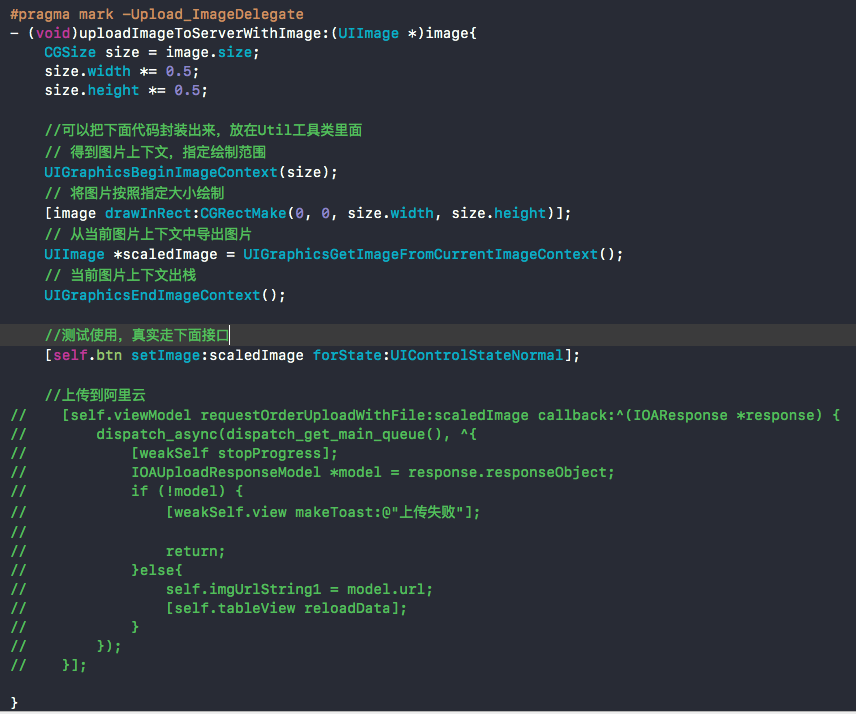单例模式--设计模式
本人已迁移博客至掘进,以后会在掘进平台更新最新的文章也会有更多的干货,欢迎大家关注!!!https://juejin.im/user/588993965333309
最近大约15天左右,自己想整理设计模式方面的问题,毕竟在研发过程中,对书写代码的质量还是有很大的提高的。本篇将讲述23中设计模式中的第一种----单例模式。读下来大约10-15分钟,前面讲述单例模式的创建方式,后面讲述项目中的实际用处,欢迎大家指正。
单例模式
一、定义
所谓的单例模式,就是一个单例类,在整个应用程序中都只有一个实例,在其中,并且提供一个类方法来供全局调用,在编译期间,会一直存储在内存中,直到App程序退出,系统自动释放此内存。
二、生命周期
在应用程序中,一个单例类在应用程序中就只能初始化一次,为了达到在使用过程中一直存在该单例,所以单例是存储在存储器的全局局域,在编译分配内存,在应用程序退出结束后由系统本身释放这部分内存。
下面是关于不同变量在手机中的存储位置
栈:临时变量(由编译器自动管理创建,分配以及释放的,栈中的内存被调用是处于存储空间中,调用完毕后会有系统自动的释放内存)
堆:通过calloc,malloc,alloc以及new来申请内存,释放也由开发者手动调用free或者delete来释放,在ARC模式下,是由系统自动管理的。
全局区域:静态变量(是由编译时来分配,App结束后由系统本身释放)
常量:常量(是由编译时分配,app结束由系统本身释放)
代码区:存放代码
三、创建方式
3.1 GCD方式(dispatch_once_t)苹果官方推荐使用(保证线程和数据安全)
#import "Upload_Image.h" static Upload_Image *uploadImage = nil; @implementation Upload_Image //单例方法 + (Upload_Image *)shareUploadImage{ static dispatch_once_t onceToken; dispatch_once(&onceToken, ^{ uploadImage = [[Upload_Image alloc]init]; }); return uploadImage; }
3.2 线程锁
#import "ViewController.h" static ViewController * _singletonVC ; @interface ViewController () @end @implementation ViewController + (instancetype)allocWithZone:(struct _NSZone *)zone{ @synchronized (self){ if (_singletonVC) { _singletonVC = [super allocWithZone:zone]; } } return _singletonVC; } + (instancetype)share{ return [[self alloc] init]; }
发现一个项目可能会有很多单例,不能每个类都手动的写一遍代码,因此可以把单例的创建写成宏,如下:
#define DJ_SINGLETON_DEF(_type_) + (_type_ *)sharedInstance;\ +(instancetype) alloc __attribute__((unavailable("call sharedInstance instead")));\ +(instancetype) new __attribute__((unavailable("call sharedInstance instead")));\ -(instancetype) copy __attribute__((unavailable("call sharedInstance instead")));\ -(instancetype) mutableCopy __attribute__((unavailable("call sharedInstance instead")));\ #define DJ_SINGLETON_IMP(_type_) + (_type_ *)sharedInstance{\ static _type_ *theSharedInstance = nil;\ static dispatch_once_t onceToken;\ dispatch_once(&onceToken, ^{\ theSharedInstance = [[super alloc] init];\ });\ return theSharedInstance;\ }
我们可以按照下面使用方法使用如下:
@interface DJSingleton : NSObject DJ_SINGLETON_DEF(DJSingleton); @end @implementation DJSingleton DJ_SINGLETON_IMP(DJSingleton); @end
四、项目使用
我们下面以我公司的上传图片和拍照的工具类为主,介绍一下单例模式的使用(也可以直接拿走用于拍照选择图片上传)直接导入Upload_Image这个类,具体demo会上传到github中

4.1 我们看一下Upload_Image.h
#import <Foundation/Foundation.h> #import <UIKit/UIKit.h> /** 定义一个单例,方便外部使用 */ #define UPLOAD_IMAGE [Upload_Image shareUploadImage] /** 代理方法 */ @protocol Upload_ImageDelegate<NSObject> //将图片上传到阿里云服务器 - (void)uploadImageToServerWithImage:(UIImage *)image; @optional - (void)uploadImageDidClickCancel; @end @interface Upload_Image : NSObject<UIActionSheetDelegate,UINavigationControllerDelegate,UIImagePickerControllerDelegate,UIAlertViewDelegate> @property (nonatomic,weak)id<Upload_ImageDelegate> delegate; @property (nonatomic,strong)UIViewController *fatherViewController; //单例方法 + (Upload_Image *)shareUploadImage; //弹出选择项窗口的方法 - (void)showActionSheetInFatherViewController:(UIViewController *)fatherVC delegate:(id<Upload_ImageDelegate>)aDelegate; @end
我们看一下实现方法
#import "Upload_Image.h" #define WS(weakSelf) __weak __typeof(&*self)weakSelf = self static Upload_Image *uploadImage = nil; @implementation Upload_Image //单例方法 + (Upload_Image *)shareUploadImage{ static dispatch_once_t onceToken; dispatch_once(&onceToken, ^{ uploadImage = [[Upload_Image alloc]init]; }); return uploadImage; } //显示ActionSheet方法 - (void)showActionSheetInFatherViewController:(UIViewController *)fatherVC delegate:(id<Upload_ImageDelegate>)aDelegate{ uploadImage.delegate = aDelegate; self.fatherViewController = fatherVC; UIAlertController* alert = [UIAlertController alertControllerWithTitle:nil message:nil preferredStyle:UIAlertControllerStyleActionSheet]; WS(weakSelf); UIAlertAction* cancelAction = [UIAlertAction actionWithTitle:@"取消" style:UIAlertActionStyleCancel handler:^(UIAlertAction * _Nonnull action) { [fatherVC dismissViewControllerAnimated:YES completion:nil]; weakSelf.fatherViewController = nil; }]; UIAlertAction* firstAction = [UIAlertAction actionWithTitle:@"使用相机拍照" style:UIAlertActionStyleDefault handler:^(UIAlertAction * _Nonnull action) { [fatherVC dismissViewControllerAnimated:YES completion:nil]; [self createPhotoView]; }]; UIAlertAction* secondAction = [UIAlertAction actionWithTitle:@"使用相册照片" style:UIAlertActionStyleDefault handler:^(UIAlertAction * _Nonnull action) { [fatherVC dismissViewControllerAnimated:YES completion:nil]; [self fromPhotos]; }]; [alert addAction:cancelAction]; [alert addAction:firstAction]; [alert addAction:secondAction]; [fatherVC presentViewController:alert animated:YES completion:^{ nil; }]; } #pragma mark - 头像图片(从相机中选择得到) - (void)createPhotoView { // ** 设置相机模式 if ([UIImagePickerController isSourceTypeAvailable:UIImagePickerControllerSourceTypeCamera]) { UIImagePickerController *imagePC = [[UIImagePickerController alloc] init]; imagePC.sourceType = UIImagePickerControllerSourceTypeCamera; imagePC.delegate = self; imagePC.allowsEditing = YES; [_fatherViewController presentViewController:imagePC animated:YES completion:nil]; } else { UIAlertView * alert = [[UIAlertView alloc] initWithTitle:@"提示" message:@"该设备没有照相机" delegate:nil cancelButtonTitle:@"确定" otherButtonTitles:nil]; [alert show]; } } #pragma mark - 图片库方法(从手机的图片库中查找图片) - (void)fromPhotos { UIImagePickerController *imagePC = [[UIImagePickerController alloc] init]; imagePC.sourceType = UIImagePickerControllerSourceTypePhotoLibrary; imagePC.delegate = self; imagePC.allowsEditing = YES; [_fatherViewController presentViewController:imagePC animated:YES completion:nil]; } #pragma mark - UIImagePickerControllerDelegate - (void)imagePickerController:(UIImagePickerController *)picker didFinishPickingMediaWithInfo:(NSDictionary *)info { [picker dismissViewControllerAnimated:YES completion:nil]; UIImage *image = [info objectForKey:UIImagePickerControllerEditedImage]; /**开始上传图片*/ if (self.delegate && [self.delegate respondsToSelector:@selector(uploadImageToServerWithImage:)]) { [self.delegate uploadImageToServerWithImage:image]; } self.fatherViewController = nil; } - (void)imagePickerControllerDidCancel:(UIImagePickerController *)picker { [picker dismissViewControllerAnimated:YES completion:nil]; // if (self.delegate && [self.delegate respondsToSelector:@selector(uploadImageDidClickCancel)]) { // [self.delegate uploadImageDidClickCancel]; // } self.fatherViewController = nil; } //- (void)imagePickerController:(UIImagePickerController *)picker didFinishPickingImage:(UIImage *)image editingInfo:(nullable NSDictionary<NSString *,id> *)editingInfo NS_DEPRECATED_IOS(2_0, 3_0); //- (void)imagePickerController:(UIImagePickerController *)picker didFinishPickingImage:(UIImage *)image editingInfo:(NSDictionary<NSString *,id> *)editingInfo{ // [picker dismissViewControllerAnimated:YES completion:nil]; //} @end
4.2 具体使用
倒入头文件,遵守代理

在使用地方拉起弹框

选择好图片之后,然后就上传到阿里云服务器

大家可以下载demo github地址:https://github.com/zxy1829760/uploadImageSingleton
五、单例模式存在的问题
5.1 内存问题
从上面知道,单例对象在程序的整个生命周期都会存在,如果单例比较大时,就会存在占据更多的内存。还有如果单例引用了另外的对象,也是个问题,别的对象引用因为单例对象不能释放从而不能释放。参看上面4.1中代码里面标红处。
对于这个问题,我们可以这样,在需要的时候加载出来,使用完之后再释放,从而不会有强引用现象,如果再次需要,下次再重新加载回来即可。
5.2 循环依赖
在我们实际开发中,单例对象可能会有属性,这些属性都是在init的时候创建以及初始化。一个单例M的m属性依赖于单例N,而单例N的属性n又依赖于单例M,就这样在初始化会出现一种情况-循环依赖问题,问题出现在dispatch_once中:如下面:
@interface DJSingletonM : NSObject DJ_SINGLETON_DEF(DJSingletonM); @end @interface DJSingletonN : NSObject DJ_SINGLETON_DEF(DJSingletonN); @end @interface DJSingletonM() @property(nonatomic, strong) id someObj; @end @implementation DJSingletonM DJ_SINGLETON_IMP(DJSingletonM); -(id)init{ if (self = [super init]) { _someObj = [DJSingletonN sharedInstance]; } return self; } @end @interface DJSingletonN() @property(nonatomic, strong) id someObj; @end @implementation DJSingletonN DJ_SINGLETON_IMP(DJSingletonN); -(id)init{ if (self = [super init]) { _someObj = [DJSingletonM sharedInstance]; } return self; } @end //--------------------------------------- DJSingletonM * s1 = [DJSingletonM sharedInstance];
如果这样写会报错误,EXC_BREAKPOINT()错误
对于可能 这样的错误,我们在设计的时候,就要考虑清楚,初始化的过程中,不依赖其它对象。如果必须要依赖,我们可以考虑异步初始化的方式,或者在内部做个标识也可。
上面就是23中设计模式的一种--单例模式,赋有变量内存,项目demo使用,以及潜在的问题讲解等,希望可以帮助大家对单例模式的使用和理解有个更好的理解,欢迎大家指正!!!
上面的demo地址:https://github.com/zxy1829760/uploadImageSingleton






【推荐】国内首个AI IDE,深度理解中文开发场景,立即下载体验Trae
【推荐】编程新体验,更懂你的AI,立即体验豆包MarsCode编程助手
【推荐】抖音旗下AI助手豆包,你的智能百科全书,全免费不限次数
【推荐】轻量又高性能的 SSH 工具 IShell:AI 加持,快人一步
· AI与.NET技术实操系列:基于图像分类模型对图像进行分类
· go语言实现终端里的倒计时
· 如何编写易于单元测试的代码
· 10年+ .NET Coder 心语,封装的思维:从隐藏、稳定开始理解其本质意义
· .NET Core 中如何实现缓存的预热?
· 25岁的心里话
· 闲置电脑爆改个人服务器(超详细) #公网映射 #Vmware虚拟网络编辑器
· 基于 Docker 搭建 FRP 内网穿透开源项目(很简单哒)
· 零经验选手,Compose 一天开发一款小游戏!
· 通过 API 将Deepseek响应流式内容输出到前端